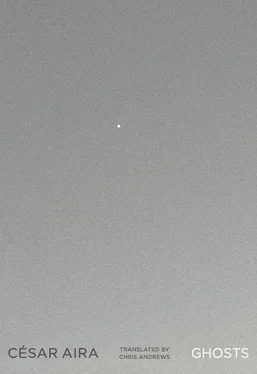Cesar Aira - Ghosts
Здесь есть возможность читать онлайн «Cesar Aira - Ghosts» весь текст электронной книги совершенно бесплатно (целиком полную версию без сокращений). В некоторых случаях можно слушать аудио, скачать через торрент в формате fb2 и присутствует краткое содержание. Город: 978-0-8112-1742-2, Год выпуска: 2009, Издательство: New Directions Publishing, Жанр: Современная проза, на английском языке. Описание произведения, (предисловие) а так же отзывы посетителей доступны на портале библиотеки ЛибКат.
- Название:Ghosts
- Автор:
- Издательство:New Directions Publishing
- Жанр:
- Год:2009
- Город:978-0-8112-1742-2
- ISBN:нет данных
- Рейтинг книги:3 / 5. Голосов: 1
-
Избранное:Добавить в избранное
- Отзывы:
-
Ваша оценка:
- 60
- 1
- 2
- 3
- 4
- 5
Ghosts: краткое содержание, описание и аннотация
Предлагаем к чтению аннотацию, описание, краткое содержание или предисловие (зависит от того, что написал сам автор книги «Ghosts»). Если вы не нашли необходимую информацию о книге — напишите в комментариях, мы постараемся отыскать её.
Ghosts — читать онлайн бесплатно полную книгу (весь текст) целиком
Ниже представлен текст книги, разбитый по страницам. Система сохранения места последней прочитанной страницы, позволяет с удобством читать онлайн бесплатно книгу «Ghosts», без необходимости каждый раз заново искать на чём Вы остановились. Поставьте закладку, и сможете в любой момент перейти на страницу, на которой закончили чтение.
Интервал:
Закладка:
The guests were cracking jokes and laughing heartily as they drank their coffee and smoked cigarettes. They all gulped their cups down and asked if there was more. If I’d known you were going to like it so much I would have made a bigger pot, said Elisa Vicuña. Still, there was enough left to give a few people a smaller second cup. The children had started to agitate about the rockets, and since Javier, who was in charge of all the pyrotechnical gear, had told them to wait for the grown-ups, not even letting them have the lighter, they kept begging the adults to finish their coffee and come and help. All right, all right. The moon bathed them all in a marvelous whiteness, which even crept into the light globe’s yellow glow. An atmosphere of carefree triviality reigned: keeping an eye on the time to see how many minutes were left, that sort of thing. The “real men” thought Patri, in her philosophical reverie, were none other than the men she could see before her now. And that was how it had to be, given everything her mother had been telling her for years. Elisa Vicuña’s thoughts had not come out of nowhere, arbitrarily. They had come out of men, and gone in a circle, from men back to men, and that route made them “real” whether or not they really were. It was almost like getting used to something, anything, even this after-dinner banality. She started to think more carefully about the problem or the choice she was facing; she tried to put her thoughts in order.
Finally the parents agreed to oversee the lighting of the fireworks. Although it would have seemed impossible only a minute before, the level of excitement among the children rose abruptly. Roberto, who according to his girlfriend was a child at heart, was the keenest to join in, and to the amusement of all present, he even reached into his pocket and produced a sizeable supply of rockets, which he had brought “just in case.” So they started with rockets, as well as jumping jacks and firecrackers. The explosions were lots of fun. They tried throwing a cracker into the pool, and the explosion resonated like a building collapsing. More! Come on! They wanted to make a much bigger din. But Javier suggested they fire off some tubes. They used an empty bottle as a launcher. Instead of choosing a distant constellation, they aimed straight at the moon. I think it’ll make it, said Ernesto. Roberto had an excellent silver lighter, which allowed him to adjust the flame’s intensity as well as its length. Raúl Viñas called it a blowtorch. They lit the first tube’s fuse and waited. Miraculously, or because it was well made (a rarity in recent times), it shot straight up into the sky leaving a golden wake. This time they all looked. It exploded way up high in a burst of very white phosphorescence. The same thing happened with the second tube, except that the explosion was red, a dark, metallic red. They had some very big, powerful fireworks, but they were keeping them for later. The smaller children, Ernesto and Jacqueline, were twirling sparklers.
The only one who wasn’t taking part in the fun, or not directly, was Patri, because she was busy thinking. It had occurred to her that she didn’t really have to wait to find out, she could make a deductive leap: by deducing correctly it was possible to tell what would happen. She couldn’t base her deductions on the ghosts, because she didn’t know anything about them. But she could use facial expressions instead. She did her very best, calling on her imagination, her unschooled — some might say naïve — creative gifts, but she kept coming to the same conclusion: the mysterious smile on the lips of the ghosts. It was inevitable, given her skeptical nature: ending with a mysterious smile, like an impenetrable barrier.
And what was the meaning of the mysterious smile? She could deduce that too, but in reverse, since any of the people here, the women sitting, the men crouching with the children and playing with the rockets, any of the things they might say or do, could provoke the mysterious smile. It was within everyone’s reach. So life in its entirety, with its infinite conclusions, was, it turned out, the deduction, the genealogy, of the mysterious smile.
While Raúl Viñas had gone off to refill his glass and drink it (which meant he would have to fill it again, but that was his business), Roberto and Javier put one of the really big rockets in a bottle to fire it off, and decided that in spite of the sparks, they would have to hold the bottle, using a napkin if need be to protect against burns, because it was so big and top-heavy it might fall over before take-off. So that was what they did; they brought Roberto’s aerodynamic lighter up to the fuse, and shouted to get everyone’s attention. Magnificently, triumphantly, trailing a dense wake or jet of sparks, the rocket shot up into the starry sky, crowded now with fireworks from every quarter of the city. As it went past the big parabolic dish, the glow lit up two ghosts floating in the night air, one perfectly vertical, the other at a slight angle, his head behind the head of his companion. That was the time: five to midnight, more or less. At midnight, they would be lined up perfectly, one behind the other, stuck together. Javier and Roberto smiled and whispered obscene remarks about that position; then almost immediately, prompted by the same association of ideas, they both looked at Patri, who was sitting very stiffly, staring into space, white as a sheet, cadaverous, so thin and haggard she could have been mistaken for a lifelike tailor’s dummy.
Around her, the women were talking about New Year’s resolutions, promises and hopes, which were sometimes indistinguishable. For Inés, it would be the pivotal year of her life, she said: the year of her marriage. The others agreed: afterward they would say “a year ago…. two years ago…. ten years ago”; it would be the milepost. And for Carmen, of course, the year would be marked by an event that was no less important for being repeated: the birth of a child. The years, they said, rolled on, and the children were the years, springing from the earth like capricious little butterflies, blown about by the breezes, by the days and weeks and months….
Suddenly the sirens blared. Midnight was imminent. The men rushed to light a string of rockets, which began to explode like joyous machine-gun fire. Before the volley was over, Patri got up and headed for the back of the terrace. Her step grew steadily quicker, although she didn’t break into a run. All at once the others realized what she was intending to do; and far from being paralyzed by surprise, they got up in turn and went to stop her: the women, the men and the children, shouting out as rockets exploded near and far, and thousands of fireworks flowered in the sky. They didn’t catch up with her, of course, although they came close. Patri leaped into the void. And that was it. The whole family came to a halt on the brink, right on the brink, and stood there speechless, as if their hearts, carried on by the momentum of the chase, had leaped as well. As she fell, Patri’s thick glasses came off and went on falling separately, beside her. A ghost, appearing suddenly from somewhere, caught them safely before they hit the ground, and rose as if lifted by a gentle spring to the edge of the terrace, where he came to rest, in front of the family, who were stunned by the tragedy. He held the glasses out to Raúl Viñas, who reached out and took them. Man and ghost stared at each other.
13th of February 1987
Интервал:
Закладка:
Похожие книги на «Ghosts»
Представляем Вашему вниманию похожие книги на «Ghosts» списком для выбора. Мы отобрали схожую по названию и смыслу литературу в надежде предоставить читателям больше вариантов отыскать новые, интересные, ещё непрочитанные произведения.
Обсуждение, отзывы о книге «Ghosts» и просто собственные мнения читателей. Оставьте ваши комментарии, напишите, что Вы думаете о произведении, его смысле или главных героях. Укажите что конкретно понравилось, а что нет, и почему Вы так считаете.












